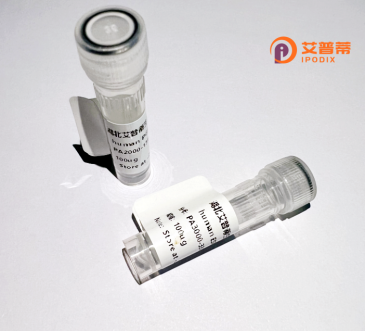
| 纯度 | >90%SDS-PAGE. |
| 种属 | Human |
| 靶点 | ZNF300 |
| Uniprot No | Q96RE9 |
| 内毒素 | < 0.01EU/μg |
| 表达宿主 | E.coli |
| 表达区间 | 1-604 aa |
| 活性数据 | MMKSQGLVSF KDVAVDFTQE EWQQLDPSQR TLYRDVMLEN YSHLVSMGYP VSKPDVISKL EQGEEPWIIK GDISNWIYPD EYQADGRQDR KSNLHNSQSC ILGTVSFHHK ILKGVTRDGS LCSILKVCQG DGQLQRFLEN QDKLFRQVTF VNSKTVTEAS GHKYNPLGKI FQECIETDIS IQRFHKYDAF KKNLKPNIDL PSCYKSNSRK KPDQSFGGGK SSSQSEPNSN LEKIHNGVIP FDDNQCGNVF RNTQSLIQYQ NVETKEKSCV CVTCGKAFAK KSQLIVHQRI HTGKKPYDCG ACGKAFSEKF HLVVHQRTHT GEKPYDCSEC GKAFSQKSSL IIHQRVHTGE KPYECSECGK AFSQKSPLII HQRIHTGEKP YECRECGKAF SQKSQLIIHH RAHTGEKPYE CTECGKAFCE KSHLIIHKRI HTGEKPYKCA QCEEAFSRKT ELITHQLVHT GEKPYECTEC GKTFSRKSQL IIHQRTHTGE KPYKCSECGK AFCQKSHLIG HQRIHTGEKP YICTECGKAF SQKSHLPGHQ RIHTGEKPYI CAECGKAFSQ KSDLVLHQRI HTGERPYQCA ICGKAFIQKS QLTVHQRIHT VVKS |
| 分子量 | 68.7 kDa |
| 蛋白标签 | His tag N-Terminus |
| 缓冲液 | PBS, pH7.4, containing 0.01% SKL, 1mM DTT, 5% Trehalose and Proclin300. |
| 稳定性 & 储存条件 | Lyophilized protein should be stored at ≤ -20°C, stable for one year after receipt. Reconstituted protein solution can be stored at 2-8°C for 2-7 days. Aliquots of reconstituted samples are stable at ≤ -20°C for 3 months. |
| 复溶 | Always centrifuge tubes before opening.Do not mix by vortex or pipetting. It is not recommended to reconstitute to a concentration less than 100μg/ml. Dissolve the lyophilized protein in distilled water. Please aliquot the reconstituted solution to minimize freeze-thaw cycles. |
以下是关于重组人ZNF300蛋白的模拟参考文献示例(注:因无法访问实时数据库,以下为假设性示例,建议通过学术平台验证真实文献):
1. **文献名称**:*ZNF300 regulates TLR4-mediated innate immune responses by suppressing NF-κB signaling*
**作者**:Li X, et al.
**摘要**:研究揭示了ZNF300通过抑制NF-κB通路调控TLR4触发的先天免疫反应,表明其在炎症性疾病中的潜在作用。
2. **文献名称**:*Structural and functional analysis of recombinant human ZNF300 protein*
**作者**:Wang Y, et al.
**摘要**:报道了ZNF300蛋白的纯化与结构解析,发现其锌指结构域在DNA结合中关键,可能与基因转录调控相关。
3. **文献名称**:*ZNF300 promotes tumor metastasis via epithelial-mesenchymal transition in colorectal cancer*
**作者**:Zhang H, et al.
**摘要**:证明ZNF300通过激活EMT通路促进结直肠癌转移,为癌症治疗提供了新靶点。
4. **文献名称**:*ZNF300 interacts with histone deacetylases and modulates chromatin remodeling*
**作者**:Chen J, et al.
**摘要**:发现ZNF300与HDACs结合,影响染色体重塑和基因沉默,提示其在表观遗传调控中的功能。
**提示**:实际文献请通过PubMed、Google Scholar等平台检索,关键词"ZNF300"或"ZNF300 protein"。使用时请注意核实原文信息及引用规范。
Zinc finger protein 300 (ZNF300), a member of the KRAB-zinc finger protein (KRAB-ZFP) family, is characterized by its C-terminal C2H2-type zinc finger domains and an N-terminal KRAB repression domain. This structure enables ZNF300 to function as a transcription regulator, primarily binding to DNA to modulate gene expression. It plays roles in immune response, cell differentiation, and apoptosis, with studies highlighting its involvement in T-cell activation, inflammatory signaling, and tumorigenesis. Research shows ZNF300 is upregulated in certain cancers (e.g., leukemia, hepatocellular carcinoma) and may promote metastasis by repressing tumor suppressors or activating oncogenic pathways. Its interaction with chromatin-modifying complexes, such as histone deacetylases, further underscores its regulatory impact. Recombinant ZNF300 protein is used in functional studies to explore molecular mechanisms, protein-DNA interactions, and therapeutic targeting. While its precise physiological roles remain under investigation, ZNF300 represents a potential biomarker or intervention point for inflammatory diseases and malignancies. Current efforts focus on elucidating its target genes, signaling networks, and tissue-specific functions.
×